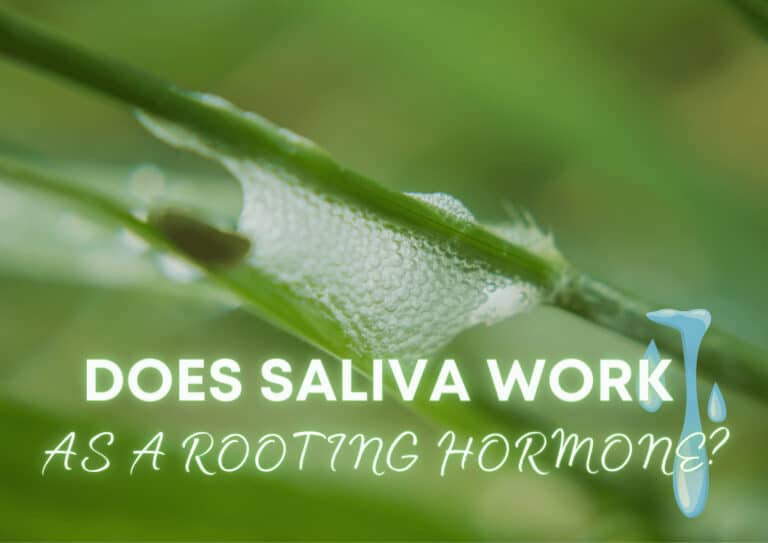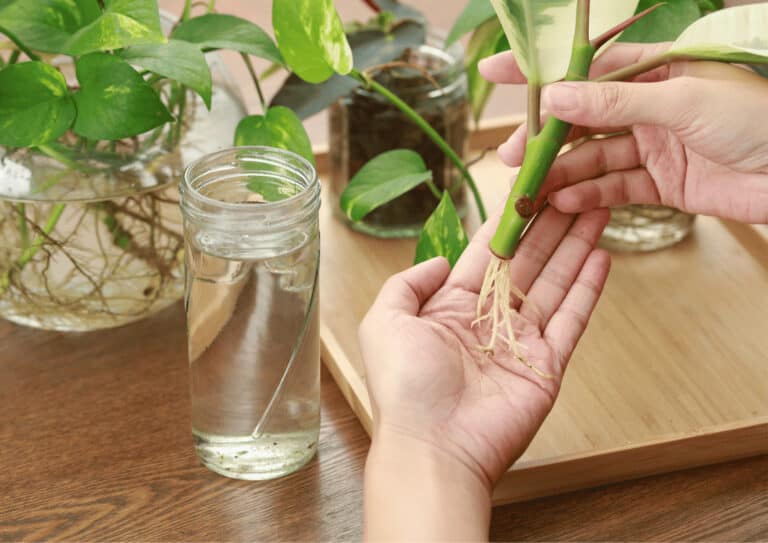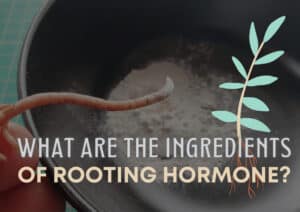Does Saliva Work As A Rooting Hormone? Examining The Science Behind The Claim
- Chris Dosser with the help of an A.I. assistant
- April 26, 2023
If you buy something using the retail links in our articles, sometimes we earn a small affiliate commission. This does not impact the products we recommend.
Many gardeners and plant enthusiasts are always on the lookout for natural alternatives to store-bought rooting hormones. One such alternative that has gained attention recently is using human saliva in place of a chemical based rooting hormone. The idea behind this is that human saliva contains enzymes and hormones which can potentially help stimulate the growth of plant roots, making it both a cost-effective and easily accessible option.
While there is some anecdotal evidence to support the use of human saliva as a rooting hormone, the scientific research on this topic is limited. Some studies suggest that the enzymes in saliva can accelerate the transformation of stem cells into root cells, but it does not directly contain the hormones that help stimulate root growth.
Nonetheless, many gardeners have reported success using saliva as a rooting hormone, and it remains a popular topic of discussion in the gardening community.
Before deciding to use saliva as a rooting hormone, it is important to understand the potential risks and benefits. This article will explore the science behind saliva as a rooting hormone, provide tips on how to use it effectively, and offer some alternative natural rooting hormones to consider.

Firstly, let’s establish what a rooting hormone actually is
Rooting hormones are chemicals that are used to stimulate the growth of roots on plant cuttings. They are typically used to speed up the rooting process and increase the success rate of propagation. Rooting hormones mimic the action of plant hormones, such as auxins, which naturally stimulate root growth.
Rooting hormones come in different forms, including powder, liquid, gel, and spray. They are available in synthetic and natural formulations. Synthetic rooting hormones are made from chemical compounds that mimic plant hormones. Natural rooting hormones are made from plant extracts or other natural substances.
Rooting hormones are not always necessary for successful propagation. Some plants can root without the use of hormones, while others may require them for optimal results. The use of rooting hormones can also depend on the type of cutting and the plant species.
How does saliva work as a rooting hormone?
The enzymes in saliva break down the plant’s cell walls, making it easier for the plant to absorb nutrients and water. This process also encourages the plant to produce more roots, which leads in turn to a stronger and more stable plant.
While saliva can be an effective rooting hormone, it is important to note that it may not work for every plant species. Some plants may require a more concentrated rooting hormone, such as a synthetic hormone or a hormone-rich plant extract. Additionally, saliva may not be effective in all growing conditions, such as in areas with extreme temperatures or low humidity.

Benefits and drawbacks of using saliva as a rooting hormone
Using saliva as a rooting hormone has its benefits and drawbacks. Here are some of the main advantages:
- It contains anti-fungal properties that help prevent damping off and pathogenic fungi from taking hold.
- The proteins in saliva help it to act as a surfactant, which can help the cutting absorb more water and nutrients, thereby promoting root growth.
- Saliva is a natural substance and does not contain any synthetic chemicals that may harm the plant or the environment.
- Saliva is readily available and free of cost.
However, there are also some drawbacks to using saliva as a rooting hormone:
- Saliva may contain harmful bacteria that can cause diseases in plants.
- It may not be as effective as commercial rooting hormones, which are specifically designed to promote root growth.
- Saliva may not work on all types of plants, and the success rate may vary depending on the plant species, cutting size, and other factors.
- Using saliva as a rooting hormone may not be a sustainable or scalable solution for commercial growers, who may need to root a large number of cuttings at once.
Overall, while saliva can be a useful and cost-effective solution for home gardeners or hobbyists who want to propagate a few cuttings, it may not be the best option for those who need consistent and reliable results or have a large-scale operation.
Alternative natural rooting hormones to saliva
While saliva has been used as an alternative to rooting hormone, research indicates that it may not be wholly effective. However, there are several natural alternatives to synthetic rooting hormones that are backed by science.
One of the most effective natural rooting hormone alternatives is willow water. Willow trees contain natural rooting hormones called auxins, which stimulate root growth in cuttings. To make willow water, simply soak a handful of willow branches in water for several days. Then, use the resulting liquid to water your cuttings.
Cinnamon is another natural rooting hormone alternative that has been shown to be effective. Cinnamon contains a compound called cinnamic acid, which can help prevent fungal growth and promote root development. Simply dip the cut end of your cutting in cinnamon powder before planting.
Honey is also a natural rooting hormone alternative as it contains natural sugars and enzymes which can stimulate root growth. Simply mix a small amount of honey with water and use it to water your cuttings.
Aloe vera gel from an Aloe plant contains natural plant hormones called gibberellins, which stimulate root growth. Simply mix a small amount of aloe vera gel with water and use it to water your cuttings.
Conclusion
After researching the topic of using saliva as a rooting hormone, it is clear that there is some evidence to suggest that it can be effective. The enzymes and proteins found in saliva have been shown to promote root growth and prevent fungal infections to some extent. However, it is important to note that there is limited controlled studies on this topic, and some experts remain skeptical of its effectiveness.
It is also worth noting that there are other rooting hormone options available on the market that have been scientifically proven to be effective. These include synthetic rooting hormones and natural alternatives such as willow water and honey. These options may be a better choice for those who are looking for a more reliable and consistent method of promoting root growth.
Overall, while saliva may be a viable option for some, it is important to approach this method with caution and to consider other proven alternatives. Further research is needed to fully understand the effectiveness of saliva as a rooting hormone.

Chris Dosser
Co-Founder of Eden Indoors
Chris is a self-taught horticulturist with over a decade of experience caring for houseplants and creating lush, thriving indoor oases. He specializes in Monstera, and by self admission has a serious problem with buying and propagating rare indoor plants!
Similar Posts
What Is Rooting Hormone Made Of? [Ingredient List]
Rooting hormones are commonly used by plant propagators of all levels of expertise. What's in them that makes them so effective at stimulating growth?
Can You Use Rooting Hormone In Water Propagation? Exploring Effective Techniques
Rooting hormone for plants is most commonly applied in a powder or gel form, but can either of these be used in the process of water propagation?



